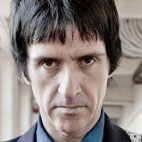and I replied ....
...
That’s not what P&O wrote.
If P&O wrote... Marr was
famous
for a jingle jangle Byrds guitar sound, a sound that he’s known for (famous for) when his contribution to The Smiths is discussed, written about.
Then I wouldn’t have posted my opinion, in hopes that he would tell us how he came to that conclusion.
Or if P&O replied back to me...
well maybe Johnny wasn’t famous for his rolling and warm chords, but the way he is playing on this unreleased Smiths instrumental, at least to me, can be described that way.
A reply, I’m sure, most would have agreed with.
And just because one person (Morrissey)
once said "It was a magical chemistry. I always heard great sadness in his rolling chords and great beauty.”
doesn’t make what Marr is
famous for in regards
to the description usually given to his guitar sound in The Smiths.
Below are just a few examples of what Marr is known for/famous for.
And it’s also the usual description of his sound that would come up when reading about The Smiths during my years of being a fan.
Strangely enough, I didn’t come across the words ‘ rolling and warm
chords’ to describe what Marr was
famous for in regards to Marr’s Smiths trademark sound.
‘
Rickenbacker 330 – This guitar is most often associated with Marr due to its 'jangly' sound for which he is known’
‘before forming the Smiths with
Morrissey in 1982. The Smiths attained commercial success and were critically acclaimed, with Marr's
jangle pop guitar style becoming distinctive of the band's sound, but separated in 1987 due to..’
‘Marr's jangly guitar-playing was influenced by
Neil Young's work with
Crazy Horse,
George Harrison (with
the Beatles) and
James Honeyman-Scott of
the Pretenders. During his time in the Smiths, Marr often tuned his guitar up a full step to F♯ to accommodate Morrissey's vocal range, and also used
open tunings and is known for creating
arpeggio melodies and (sometimes) unusual chord progressions and makes wide use of open strings while chording to create
chiming.’


en.m.wikipedia.org
‘These soon paved the way for one of the most influential bands of all time: The Smiths. In “Jingle Jangle Johnny”, writer and guitarist Holly Flynn writes about how Johnny Marr the guitarist of the Smiths, for once had to live with the childish nickname “Jingle-Jangle Johnny” (99). Marr was “a self-confessed melody freak, constantly searching for new soundscapes and intricacies in his Rickenbackers” (Flynn 100). He was known for his right-hand picking technique—perfect for the jangle tone of the Rickenbacker...’
This domain may be for sale!
thedailyseni.com
‘Marr’s ethos was pointedly at odds with the bombastic flash of many of rock’s big players, instead opting for an authentic, Rickenbacker-flavoured jangle. Marr’s work rippled with a maturity that belied his young age, at a time when many chart-operators were fancifully trying to bring forward a synth-pop soundtracked future.
Though he took influence from iconic 60s groups like The Byrds..’
Johnny Marr’s unparalleled ability for weaving some of the most emotionally-charged, melodically sumptuous guitar parts in the history of pop continues to captivate.

www.google.com
‘But The Smiths lead vocalist isn't the one we're calling Jangle Pop Shakespeare. That title would have to go to The Smith's guitarist, Johnny Marr. All jangle pop artists who came after him were inspired by him in some way, directly or indirectly, and all pioneers who came before him wouldn't be regarded as "jangle pop" if it weren't for him revolutionizing the sound.’
Jangle Pop There are a lot of subgenres of rock music. If you grew up with the evolution of rock music, you probably remember their names just as easily as you remember the names of your favorite bands. But if you're a younger fan, some of the names can get a little confusing. One of those...

playalonerecords.com
‘...an excellent example of the ‘jingle-jangle’ sound often associated with Johnny Marr’s guitar style.’
‘Johnny Marr: jingle-jangle genius’
Ever since The Smiths broke up in 1987, some of us have looked despondent, like old cowboys who've just returned from burying one of their gang out by the old corral. A part of us was gone, forever.

m.independent.ie
‘Although critics were quick to label Marr's style as 'Jingle Jangle' ...’
Johnny Marr's multi-layered guitar parts on his '80s recordings with the Smith's influenced and ...

www.guitarinteractivemagazine.com
‘Jingle and jangle are the words most often used to describe
Johnny Marr's guitar sound..’
Marr talked at length about the new instrument, life with the Smiths, and how limitations can be a good thing musically speaking.

www.ultimate-guitar.com
The threads topic was The Smiths.
Why do you keep on insisting that Marr’s trademark sound was his ‘rolling and warm chords’.
For that IS the description you gave to Marr’s sound (post#15) it is that description that you said he was ‘famous for’.
And that is what we are discussing.
If they wanted Marr for his
trademark sound, then it is most likely the sound he was known for, which was that ‘jingle-jangle Byrds’ sound that he’s been described as having. Though, yes, he is capable of a lot more.
@SuedeMoz
just because one person (Morrissey)
once said "It was a magical chemistry. I always heard great sadness in his rolling chords and great beauty.”
doesn’t make what Marr is
famous for in regards to his guitar sound in The Smiths.
nothing to dig. We are discussing
what is and what is not the usual description given to Marr’s Smiths sound or what can be called Marr’s trademark, famous for, known for, guitar sound in The Smiths. And it
is not ‘those rolling and warm chords, that Johnny was famous for’
That’s not to say he’s not capable of displaying that also.
Nope. No need to say that. Because we are only discussing what Smiths sound Marr was famous for, known for, his trademark sound.









